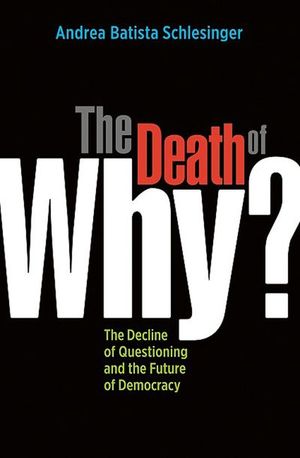The Death of "Why?"
Published by Berrett-Koehler Publishers
A look at how Americans are losing their sense of curiosity and skepticism, and how some are working to change that.
The spirit of inquiry is the engine of democracy. The democratic process is nothing less than citizens regularly asking what kind of society they want to live in and whom they want to lead them. But more and more people are avoiding the whole messy business of questioning. Americans are instead being trained to look for ready-made answers, with potentially dire implications for the health of our society.
In this impassioned new book, Andrea Batista Schlesinger argues that we’re besieged by cultural forces that urge us to avoid independent thought and critical analysis. The media reduces politics to a spectator sport, focusing on polls and personalities rather than issues and ideas. Schools teach to standardized tests—students learn to fill in the bubbles, not open their minds. “Financial literacy” courses have replaced civics classes, graduating smart shoppers rather than informed citizens. Even the Internet promotes habits that discourage inquiry. Regurgitating search-engine results becomes a substitute for genuine research and reflection. Social networks promote connection rather than engagement. With all the information available online, over a third of those younger than twenty-five say they get no news on a typical day, up from twenty-five percent in 1998.
The situation isn’t hopeless. Batista Schlesinger spotlights individuals and institutions across the country that are working to renew a healthy sense of curiosity and skepticism, particularly in American’s youth. It is, at this point, an uphill battle but one well worth undertaking. The Death of “Why?” offers both a penetrating socio-cultural critique of our current path and a way forward for cultivating inquiry and reinvigorating our democracy.
“From her start in politics as a teenager Andrea Batista Schlesinger has asked the important questions. Now she asks her most important: are we teaching young people to value inquiry, and if not, what hope can we have for the future of democracy?”—Katrina vanden Heuvel, Publisher, The Nation
“The Death of “Why?” makes the case that we cannot create social change without a culture of questioning. We should pay close attention to this brilliant contribution.”—Deepak Bhargava, executive director, Center for Community Change
“She asks the right questions at a time when we seem more eager for answers that we don’t understand or care about.”—Deborah Meier, Senior Scholar, New York University, author of In Schools We Trust and The Power of Their Ideas, and founder of innovative New York and Boston area public schools
BUY NOW FROM
COMMUNITY REVIEWS

